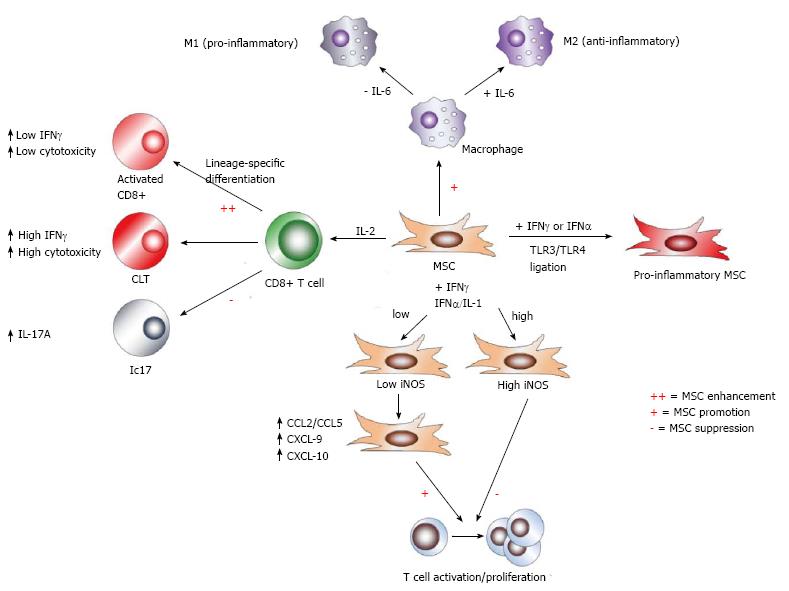Copyright
©2014 Baishideng Publishing Group Inc.
World J Stem Cells. Nov 26, 2014; 6(5): 526-539
Published online Nov 26, 2014. doi: 10.4252/wjsc.v6.i5.526
Published online Nov 26, 2014. doi: 10.4252/wjsc.v6.i5.526
Figure 6 Effects of cytokine milieu on mesenchymal stem cell immune-modulation.
Mesenchymal stem cell (MSC) modulation of immune responses is strongly affected by the makeup of cytokine milieus. Toll-like receptor (TLR) ligation in conjunction with interferon signaling drives MSCs down a pro-inflammatory route. While high concentrations of the pro-inflammatory cytokines IFNγ and either tumor necrosis factor-α (TNF-α) or IL-1 have been shown to induce iNOS and NO in MSCs to mediate suppression of T cell proliferation, low concentrations of these factors fail to fully induce iNOS, and instead enhance T cell proliferation, presumably via cytokine-induced chemokines. Furthermore, MSCs differentially affect the polarization of effector CD8+ T cell subsets: through enhanced early IL-2 expression induced by MSCs, activated CD8+ T cells exhibit increased IFNγ expression and cytotoxicity, while fully differentiated cytotoxic T lymphocytes (CTLs) are largely unaffected by MSC action. In contrast, MSCs potently suppress Tc17 development. Moreover, IL-6 signaling acts as a switch for MSC immune-modulation of macrophages. In the presence of IL-6, MSCs retain promotion of M2, but favor M1 polarization in the absence of this cytokine.
- Citation: Glenn JD, Whartenby KA. Mesenchymal stem cells: Emerging mechanisms of immunomodulation and therapy. World J Stem Cells 2014; 6(5): 526-539
- URL: https://www.wjgnet.com/1948-0210/full/v6/i5/526.htm
- DOI: https://dx.doi.org/10.4252/wjsc.v6.i5.526









